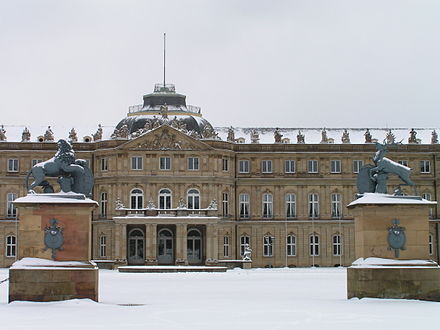Nationalism is an idea and movement that promotes the interests of a particular nation especially with the aim of gaining and maintaining the nation's sovereignty (self-governance) over its homeland. Nationalism holds that each nation should govern itself, free from outside interference (self-determination), that a nation is a natural and ideal basis for a polity, and that the nation is the only rightful source of political power. It further aims to build and maintain a single national identity—based on shared social characteristics of culture, ethnicity, geographic location, language, politics, religion, traditions and belief in a shared singular history —and to promote national unity or solidarity. Nationalism, therefore, seeks to preserve and foster a nation's traditional cultures, and cultural revivals have been associated with nationalist movements. It also encourages pride in national achievements, and is closely linked to patriotism. Nationalism is often combined with other ideologies, such as conservatism or socialism.

Baden-Württemberg is a state in southwest Germany, east of the Rhine, which forms the border with France. It is Germany's third-largest state, with an area of 35,751 km2 (13,804 sq mi) and 11 million inhabitants. Baden-Württemberg is a parliamentary republic and partly sovereign, federated state which was formed in 1952 by a merger of the states of Württemberg-Baden, South Baden and Württemberg-Hohenzollern. The largest city in Baden-Württemberg is the state capital of Stuttgart, followed by Karlsruhe and Mannheim. Other cities are Freiburg im Breisgau, Heidelberg, Heilbronn, Pforzheim, Reutlingen, Tübingen and Ulm.

The history of Baden-Württemberg covers the area included in the historical state of Baden, the former Prussian Hohenzollern, and Württemberg, part of the region of Swabia since the 9th century.

Swabian is one of the dialect groups of Alemannic German that belong to the High German dialect continuum. It is mainly spoken in Swabia which is located in central and southeastern Baden-Württemberg and the southwest of Bavaria. Furthermore, Swabian German dialects are spoken by Caucasus Germans in Transcaucasia. The dialects of the Danube Swabian population of Hungary, the former Yugoslavia and Romania are only nominally Swabian and can be traced back not only to Swabian but also to Frankonian, Bavarian and Hessian German dialects, with locally varying degrees of influence of the initial dialects.

Swabia is a cultural, historic and linguistic region in southwestern Germany. The name is ultimately derived from the medieval Duchy of Swabia, one of the German stem duchies, representing the territory of Alemannia, whose inhabitants interchangeably were called Alemanni or Suebi.
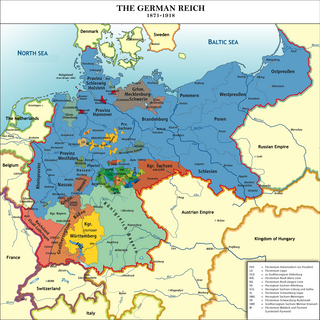
The Unification of Germany into a German Empire with tight political and administrative integration, replacing the decentralized German Confederation and Holy Roman Empire, was officially proclaimed on 18 January 1871, in the Hall of Mirrors at the Palace of Versailles in France. Princes of the German states, excluding Austria-Hungary and its House of Habsburg-Lorraine, gathered there to proclaim William I of Prussia and the House of Hohenzollern as German Emperor, following the French capitulation in the Franco-Prussian War.
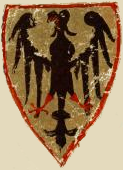
German nationalism is an ideological notion that promotes the unity of Germans and German-speakers into a nation state. German Nationalism emphasizes and takes pride in the national identity of Germans. The earliest origins of German nationalism began with the birth of romantic nationalism during the Napoleonic Wars when Pan-Germanism started to rise. Advocacy of a German nation-state began to become an important political force in response to the invasion of German territories by France under Napoleon.
A stateless nation is an ethnic group or nation that does not possess its own state and is not the majority population in any nation state. The term "stateless" implies that the group "should have" such a state. Members of stateless nations may be citizens of the country in which they live, or they may be denied citizenship by that country. Stateless nations are usually not represented in international sports or in international organisations such as the United Nations. Nations without state are classified as fourth-world nations. Some of the stateless nations have a history of statehood, some were always a stateless nation, dominated by another nation.
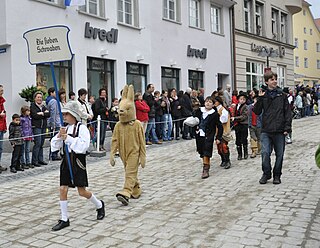
Swabians are Germanic people who are native to the ethnocultural and linguistic region of Swabia, which is now mostly divided between the modern states of Baden-Württemberg and Bavaria, in southwestern Germany.

Upper Swabia is a region in Germany in the federal states of Baden-Württemberg and Bavaria. The name refers to the area between the Swabian Jura, Lake Constance and the Lech. Its counterpart is Lower Swabia (Niederschwaben), the region around Heilbronn.
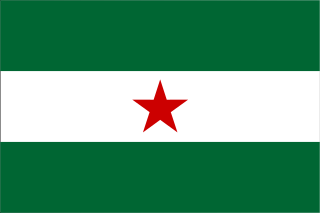
Andalusian Nation is an Andalusian nationalist, independentist and socialist political party in Andalusia (Spain). Its organ of expression is the magazine Independencia. NA is a founding member of the former coalition National Assembly of Andalucía, which the organization left in 2004.

Riffians, by others also known as Riyafa or Rwafa, are a Berber-speaking people of Northwestern Africa, who derive their name from the Riff region in the northern edge of Morocco. Being a part to Gibraltar Arc and living close to the Iberian peninsula, communities of Riffians are found both in northeastern Morocco and southern Spain, as well as elsewhere in Western Europe and North Africa. Their native settlements were Arabized and Islamized in and after the 7th-century, during the early expansion of Islam. They are overwhelmingly maraboutic Sunni Muslims, but retain their pre-Islamic traditions and culture and still retain largerly their native language.
An ethnic flag is a flag that symbolizes a certain ethnic group. Ethnic flags are often introduced to the ethnic community through the respective cultural or political ethnic movements. They are popular among diasporas, ethnic minorities, and some ethnic majorities, especially in multiethnic countries.

The coat of arms of the Kingdom of Württemberg shows an impalement of the three black antlers that represent Württemberg on the dexter side, and the three black lions passant of medieval Swabia on the sinister side, both on a gold field.
Gerhard Raff is a German historian, editor and publisher, well known around Swabia for his writings on history in the Swabian dialect of German, e.g. in a weekly column for the Stuttgarter Zeitung.

Bavarian nationalism is a point of view that asserts that Bavarians are a nation and promotes the cultural unity of Bavarians. It has been a strong phenomenon since the incorporation of Bavaria into the state of Germany in 1871. Bavarian nationalists find the terms that Bavaria entered into Germany in 1871 to be controversial and claimed that the German government has long intruded on the desired autonomy of Bavaria, and calls have been made for independence of Bavaria. After the defeat of Germany in World War I, Bavarian nationalism grew in strength, becoming popular amongst both revolutionary and reactionary political movements. Following the collapse of Austria-Hungary after World War I, proposals for Austria to join Bavaria were made. At this time the Bavarian government held particular interest in incorporating the regions of North Tyrol and Upper Austria into Bavaria. This was a serious issue in the aftermath of World War I with significant numbers of Austria's North Tyrolese declaring their intention to have North Tyrol join Bavaria.

Rhenish nationalism is the point of view that asserts that Rhinelanders are a nation and promotes the cultural unity of Rhinelanders.

Württemberg is a historical German territory roughly corresponding to the cultural and linguistic region of Swabia. Together with Baden and Hohenzollern, two other historical territories, it now forms the Federal State of Baden-Württemberg. Württemberg was formerly also spelled Würtemberg and Wirtemberg.

The Soviet Republic of Saxony was a short-lived, unrecognised socialist state during the German Revolution of 1918–19 based in Saxony.

